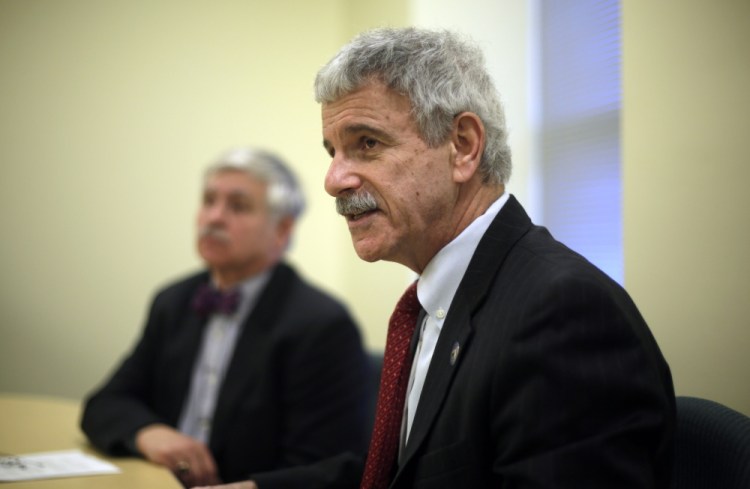Gov. Paul LePage has 10 days to decide whether to sign a marijuana bill adopted by state legislators in special session Monday.
The two-term Republican has sent mixed messages on the measure that passed in both houses but fell shy of the two-thirds majority required to override a gubernatorial veto.
Now people on both sides of the marijuana debate are waiting to see whether LePage will sign the bill, veto it or let it become law without his signature.
LePage is a staunch marijuana critic, calling it a “deadly” gateway drug, but occasionally he has suspended that opposition, or put limits on it.
In 2014, at a political debate hosted by the Maine Chamber of Commerce at the height of his re-election campaign, LePage said he could see himself supporting legalization, taxation and regulation of recreational marijuana if it was the result of a referendum vote. His six-word reply – “if it were a referendum, yes” – to the moderator’s question made LePage the most marijuana-friendly candidate on the stage that night.
In January, LePage signed a proclamation certifying the contested results of the legalization referendum after hinting that he might not.
CONFLICTING SIGNALS ON POSITION
Those who support the marijuana bill are clinging to these examples in the hope that LePage will sign the bill and launch the commercial market in Maine. To them, the bill approved by the Legislature is the culmination of the referendum drive, spelling out the tax and licensing rules needed to allow commercial cultivation and retail sales.
“The bill passed by significant margins in both houses,” said Sen. Roger Katz, R-Augusta, who co-chaired the special committee that drafted the legislation. “I’m mindful of the fact that the governor has said he would be respectful of the referendum results. We will be reaching out to the governor tomorrow to ask him to sign the bill. We hope that he will.”
Katz said he will urge LePage to talk to Colorado Gov. John Hickenlooper, who opposed legalization during that state’s referendum but accepted the results, eventually ushering in the nation’s first recreational marijuana regulatory system. During heated debate Monday in Augusta, Katz urged lawmakers who opposed the referendum to “channel your inner Hickenlooper” and move from legalization to implementation.
But LePage’s abbreviated debate comment and his reluctant referendum certification are likely the exception to the rule for the governor when it comes to cannabis.
During last year’s Question 1 campaign, LePage released a video in which he said marijuana is “not just bad for Maine, it can be deadly.” He said legalization would lead to an increase in traffic fatalities, like it had in Colorado, something state officials there denied was the case. And he said accidental ingestion of recreational cannabis could kill Maine children and pets.
PROPONENTS SEEKING MORE SUPPORT
Just last week, LePage joined forces with House Minority Leader Ken Fredette to introduce a governor’s bill that would extend the moratorium on the rulemaking, licensing and regulatory parts of the voter-approved law needed to start commercial cultivation and sales, from February 2018 to January 2019. That bill died Monday, but it suggests LePage isn’t ready to launch an adult-use market in Maine.
“I won’t speak for the governor, but he wouldn’t submit a moratorium bill if he liked where we were headed,” Fredette said last week. Monday, Fredette claimed that House Republicans had dealt a “potentially fatal blow to (a) flawed marijuana bill” because the “Legislature clearly does not have enough votes to move this bill forward over a governor’s veto.”
LePage himself is not yet saying what he’ll do. A spokesman would only lay out legislative options Tuesday, but didn’t reveal the governor’s plans.
Supporters of the bill took a short break Tuesday to recover from a 12-hour special session, but began mapping out strategy by late afternoon.
The state chapter of the Marijuana Policy Project sent out a statement titled “FLASHBACK” that included a clip of LePage’s debate comments and urged him to support what David Boyer, the project’s director, referred to as a campaign pledge. Boyer posted lawmakers’ votes on the bill on Facebook to congratulate supporters, and asked advocates to lobby those lawmakers who had voted no.
“I think we can pick up votes, definitely,” Boyer said. “We are confident we can get enough people for an override.”
IF BILL VETOES, LEGISLATURE RETURNS
If LePage vetoes the bill, the Legislature would reconvene to vote on the bill again. It would need the support of two-thirds of those present to survive the veto. Katz said Tuesday that he and his committee co-chairman, state Rep. Teresa Pierce, D-Falmouth, are talking with colleagues who voted against the legislation Monday to see if they can alleviate any of their concerns about the bill.
“This isn’t about legalization anymore,” Katz said. “That train has left the station. This is about taxing and regulating marijuana. About taking a thing that the people supported at referendum, a thing that I didn’t vote for, by the way, and doing it as well as we can. I think if we explain the bill like that, we can get it over the finish line.”
Penelope Overton can be contacted at 791-6463 or at:
poverton@pressherald.com
Twitter: PLOvertonPPH
Send questions/comments to the editors.




Comments are no longer available on this story